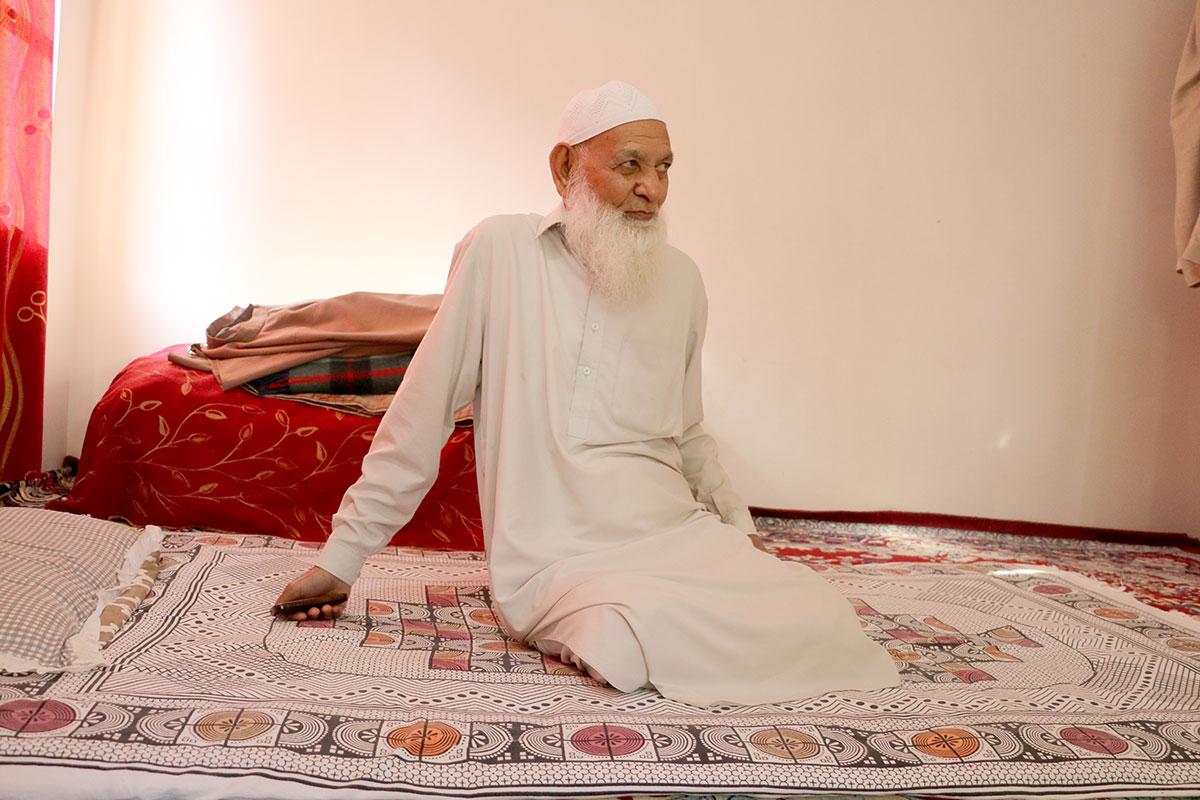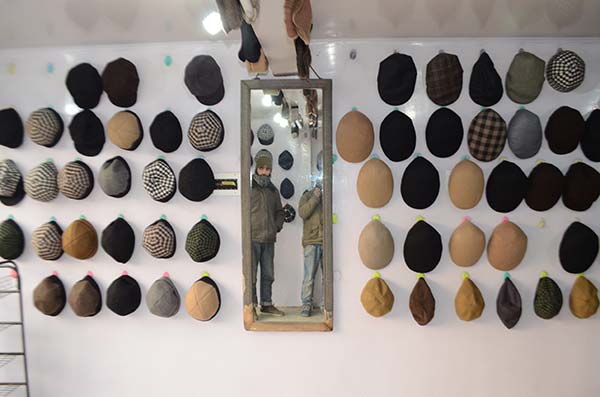After reading two books, he gave up a lucrative teacher’s job, which was the lone source of his income to feed a large family. Shuttling between jail and the Jamaat, he gave his son to militancy and rose to become the president of Jamaat for six years. At 82, the smiling but ailing Sheikh Ghulam Hassan shares a part of his story with Muhammad Younis

In his room, barely a few minutes of sitting on a steel chair, he returns to his mattress, still laid out during broad daylight. He wants to take rest. He is frail to his bones now. Spreading his limbs straight down, he turns his head towards the visitors. His lips shiver while talking. At times, it becomes hard to decipher his words. Since he suffers from forgetfulness, it takes him a while to summon the past of his life from his memory. While he does that, not for a moment, the smile leaves his face, filled with long snow-white tufts.
In Kulgam’s Tarigam village, Sheikh Ghulam Hassan, twice the Ameer, the head, of Jammat-e-Islami, from 2006 to 2012, in Jammu and Kashmir, spends most part of his time at his home now; a white stuccoed two storey building, situated on a stream that snakes through the hamlet. It has been more than five decades since he joined the organisation. Looking back at his Jamaat life, there have been many ups and downs with each passing day, but he didn’t ever say it a bye.
It was on May 26, 1936, when Sheikh was born in Tarigam to Saifullah and Sajida Banu. Their family had scanty means of livelihood. At the age of two and a half years, Sheikh became an orphan. His mother took it upon herself to raise him and his sister all by herself. In 1956, Sheikh did his matriculation, then a rare feat. Given the financial circumstances at home, he immediately had to look for a job, which landed him at the High School of Damhal Hanjipora where he started teaching. But this didn’t end his desire to go for further education. During his stint as a teacher, Sheikh completed his twelfth and Bachelors in Humanities. In 1967, while he was pursuing B-Ed, he became an ardent reader of Islamic literature. Mostly, the books written by Maulana Maududi, the founder of Jammat-e-Islami found space in his small library at home. Sheikh believes two books by Moudoudi had a huge impact on his life: Islam ka Nazriyae Siyasi and Tankihaat. Soon, he took leave from his job to work for the organisation.
“Both the books are weaved around the revolutionising concept of politics in Islam. They talk about Islam as a complete code of conduct and the way of life, thus want the religion to have its own political system,” Sheikh said in his soft, breaking voice. “Until reading these two books, my presumption of Islam as a religion was it being a merely private affair in a person’s life.”

For the entire family – Sheikh’s mother, his six children and wife, his sister and her three children (she lived with him), he was the lone bread earner. Despite all these compulsions, he made the decision to officially join the organisation in 1968. “Though on one side, I had to earn for my family, but on the other, the restlessness that both the books had caused in me, made me go for the latter.”
In the aftermath, Sheikh said that life became very hard and penurious, but he and his family was patient enough. “I had the only desire of contributing my bit for Ikaamat-i-Deen (establishing the faith), the sole purpose of the Jammat-e-Islami – and I was ready to endure come what may.”
At the time of Sheikh’s introduction in the organisation, its pioneers in Jammu and Kashmir, Moulana Saiduddin Tarabali and Qari Saifuddin of Srinagar, Hakeem Ghulam Nabi of Pulwama, Maulana Ghulam Ahmad Ahrar of Shopian and others were all alive.
In the 1970s, under the Jamaat’s then Amir-e-Zila, the district president, Ghulam Ahmad Ahrar in Islamabad, the first main post that Sheikh worked on was that of a district secretary. “At that time, the districts of Islamabad, Pulwama, Shopian and Kulgam were just one district. And when administrative divisions took place, later, I was promoted to the district president of Islamabad as Ahrar Sahib moved to Pulwama.”
Talking about the members of the Jammat at that time, Sheikh says that all of them were “determinate to the cause”, and would work day in and out for its propagation. “The members would travel long distances on foot to meet their brethren, hold meetings, spread the Jamaat literature and deliver speeches,” Sheikh said. One thing that Sheikh specifically makes mention of and expresses pride about is that the organisation opened many schools throughout the state. “In those schools, both modern and religious disciplines were being imparted among the students. I believe it was our main contribution to society.”
After Sheikh Mohammad Abdullah invoked emergency in 1975 – an extension of Indira Gandhi’s action in Delhi, and banned the chain of schools, Jamaat later re-organised the network under the Falah-e-Aam Trust. Since 1988, the Trust is running these schools.
The roots of Jamaat lay in the Islamic reformist and anti-Dogra movements in Kashmir. Almost all of its initiators in the state came from middle-class families associated with Sufism but were dissatisfied with the state and status of the Islam. Politically, it was against the popular political party. On the religious front, it opposed the Shirk, the grave worship in particular. On societal issues, it preached against Bidaat, inclusions in rituals and practices. This was upsetting for all, the traditional politics, the economy of faith and the social order created by superimposing culture on faith. Many Sufis, considering the Jamaat a threat to their own interests, thus associated the party with the ‘worldwide nexus’ of Wahhabism. The party fought all this using education, plain and basic.
“This was the reason why in the early period of Jamaat, there was a lot of resentment among the masses against it, but with time, because of the growth in education, it faded away,” Sheikh believes. Jamaat was also “disillusioned” with both the secular politics of the National Conference and the Muslim nationalism advocated by the Muslim Conference”. Its stand on Kashmir makes it a different organisation in comparison to the Jamat-e-Islami Hind.
In 1977, Jamaat took a unanimous decision to participate in the elections to the state assembly. Sheikh says that the decision had certain objectives in the backdrop. “First we wanted our message to reverberate in the assembly, second we wanted to inhibit the passage of un-Islamic laws in the assembly, and third was to represent the dispute of Jammu and Kashmir in a legal way,” Sheikh said. Only five of its members won of 22 contestants. “The polls were rigged.”
In 1975, when the emergency was proclaimed in Dehli, Jamaat was one among many groups which had to bear the brunt. The schools run by it in the state were immediately shut, and its members, particularly at district and tehsil level, were put behind the bars. It was on this occasion that Sheikh had to see the jail for the first time in his life.
“I spent about half a year in central jail Srinagar at that time. The other colleagues of mine were sent to different jails in Jammu,” Sheikh remembers. Later, the jail became somewhat a parallel home to Sheikh. “Although my jail life is lesser than those of my other colleagues, still, I have collectively spent almost six years in different jails of the state, particularly in Srinagar, Jammu and Hiranagar.”

The year 1979 unleashed “reign of terror” on Jammat in the state. When Zulfikar Ali Bhutto was sent to the gallows by General Zia-ul-Haq in Pakistan, the Jammat was dubbed as the main culprit behind the hanging. Sheikh vividly remembers the night of April 4, 1979, when one of his friends, Abdul Razak Mir (would later become an MLA of Jammat and was murdered during militancy) from a nearby village Buchoro, came to his house, telling him that they should leave their homes and go to Srinagar. He had apprehensions of them being killed by the commoners. His speculations weren’t totally unfounded; from the other areas of the state, reports had been coming about the killing of Jammat members and burning and ransacking of their properties. “Leaving behind our families, we left in the wee hours of the night,” Sheikh recalls.
Three days later, Sheikh and Mir, given escort by Muhammad Akbar Khan, the then Divisional Commissioner, returned to their homes. But what they found at the place of their houses were charred structures. On the side of the stream, where Sheikh’s current house is situated in Tarigam, around 100 houses of Jammat members had been burned to ashes. Same was the fate with the houses of Jammat members at Bucchero. But apart from Mir’s house, his apple orchard, consisting of more than a hundred productive trees had been axed.
“The mind behind the happenings was for sure the members of the National Conference and Communist elements, but unfortunate was that even religious parties fell prey to their conspiracy, and thus were instrumental in the rioting and marauding,” Sheikh regretted.
Before the incident, Sheikh claims they had already gone to Umar Jaan, the Deputy Commissioner of Islamabad, regarding the anti-Jamaat conferences being held in the area and venom spewed against their doings and all. “Although he (Umar Jaan) provided us assurance, he didn’t go further than that,” Sheikh remembers. “But still what could have he done, he was under pressure.”
Letting bygones be bygones, Jammat decided to take part in 1984 elections but failed to win a single of the 26 seats it contested. “There was massive rigging in the polls again.” The last time the Jamaat contested the elections was in 1987, which, according to Sheikh, fell victim to rigging too. It was an election contested under the Muslim United Front (MUF) banner and Jamaat had managed using the strong anti-NC wave to its benefit. But it eventually was given five seats as many of its contesting leaders were jailed directly from the polling stations. One of them was Mohammad Yousuf Shah, now known as Syed Salahuddin.
By 1990, the Jamaat and many other Kashmiri groups changed their position of advocating peaceful struggle and joined militancy. After Jammu Kashmir Liberation Front (JKLF) take off, Jamaat adopted Hizbul Mujahideen (HM) as the group’s “militant wing”. It created a situation that Jamaat got directly involved with the militancy.
Sheikh’s elder son, Muhammad Iqbal, 22 years old then, was one among the people who picked up arms. Four years later, he was killed in an encounter. And one day, during the heydays of Ikhwan in Kashmir, Abdul Razak Mir, Sheikh’s friend, was killed by its personnel. From Buchoro, he was dragged barefoot to Kulgam, and from there, to village Laru where he was shot. “Being paraded through the market of Kulgam, when people around had watched him (Mir) shouting that he had done no guilt baring that he was only a member of Jamaat and its MLA, they had downed their eyes in helplessness,” Sheikh said.
From handful members in the inception, when Jamaat was to see resentment from every quarter, Sheikh says, the organisation has now grown into a big force to reckon with. “Many tried to remove our roots, but we were, we are and we will be working for our cause until our last breath,” he says. “Because of the growing ambit of Jammat, there is no denying of the fact that problems could have crept inside, but each of our members is working to make Jamaat from good to best.”
















pious life of Sheikh Gulam Hassan Amir Jamath